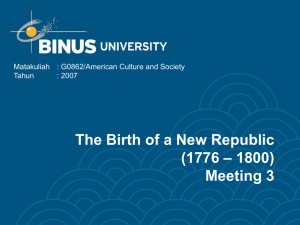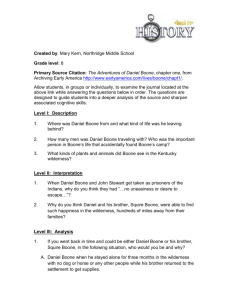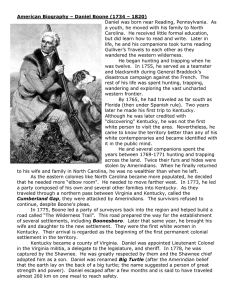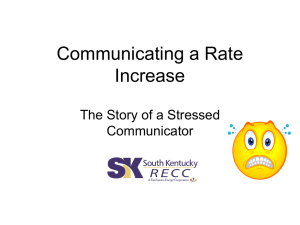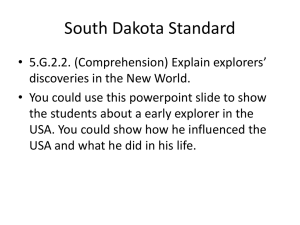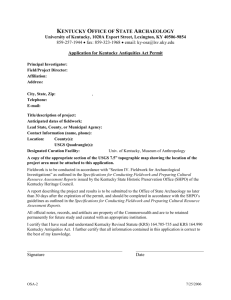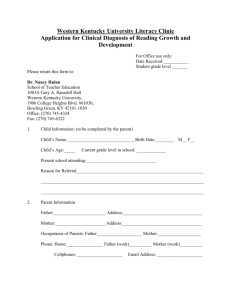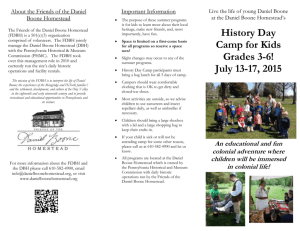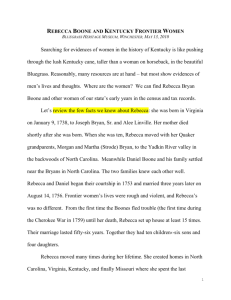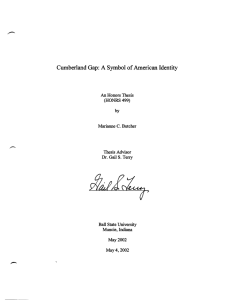Daniel Boone
advertisement
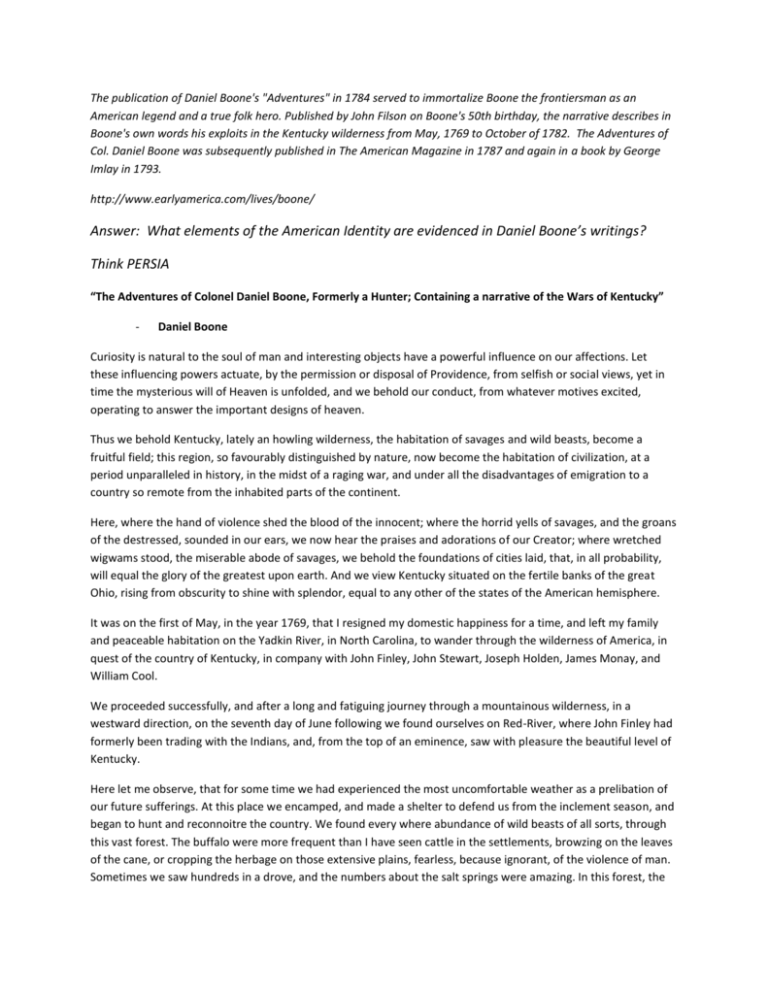
The publication of Daniel Boone's "Adventures" in 1784 served to immortalize Boone the frontiersman as an American legend and a true folk hero. Published by John Filson on Boone's 50th birthday, the narrative describes in Boone's own words his exploits in the Kentucky wilderness from May, 1769 to October of 1782. The Adventures of Col. Daniel Boone was subsequently published in The American Magazine in 1787 and again in a book by George Imlay in 1793. http://www.earlyamerica.com/lives/boone/ Answer: What elements of the American Identity are evidenced in Daniel Boone’s writings? Think PERSIA “The Adventures of Colonel Daniel Boone, Formerly a Hunter; Containing a narrative of the Wars of Kentucky” - Daniel Boone Curiosity is natural to the soul of man and interesting objects have a powerful influence on our affections. Let these influencing powers actuate, by the permission or disposal of Providence, from selfish or social views, yet in time the mysterious will of Heaven is unfolded, and we behold our conduct, from whatever motives excited, operating to answer the important designs of heaven. Thus we behold Kentucky, lately an howling wilderness, the habitation of savages and wild beasts, become a fruitful field; this region, so favourably distinguished by nature, now become the habitation of civilization, at a period unparalleled in history, in the midst of a raging war, and under all the disadvantages of emigration to a country so remote from the inhabited parts of the continent. Here, where the hand of violence shed the blood of the innocent; where the horrid yells of savages, and the groans of the destressed, sounded in our ears, we now hear the praises and adorations of our Creator; where wretched wigwams stood, the miserable abode of savages, we behold the foundations of cities laid, that, in all probability, will equal the glory of the greatest upon earth. And we view Kentucky situated on the fertile banks of the great Ohio, rising from obscurity to shine with splendor, equal to any other of the states of the American hemisphere. It was on the first of May, in the year 1769, that I resigned my domestic happiness for a time, and left my family and peaceable habitation on the Yadkin River, in North Carolina, to wander through the wilderness of America, in quest of the country of Kentucky, in company with John Finley, John Stewart, Joseph Holden, James Monay, and William Cool. We proceeded successfully, and after a long and fatiguing journey through a mountainous wilderness, in a westward direction, on the seventh day of June following we found ourselves on Red-River, where John Finley had formerly been trading with the Indians, and, from the top of an eminence, saw with pleasure the beautiful level of Kentucky. Here let me observe, that for some time we had experienced the most uncomfortable weather as a prelibation of our future sufferings. At this place we encamped, and made a shelter to defend us from the inclement season, and began to hunt and reconnoitre the country. We found every where abundance of wild beasts of all sorts, through this vast forest. The buffalo were more frequent than I have seen cattle in the settlements, browzing on the leaves of the cane, or cropping the herbage on those extensive plains, fearless, because ignorant, of the violence of man. Sometimes we saw hundreds in a drove, and the numbers about the salt springs were amazing. In this forest, the habitation of beasts of every kind natural to America, we practiced hunting with great success, until the twentysecond day of December following. In the decline of the day, near Kentucky river, as we ascended the brow of a small hill, a number of Indians rushed out of a thick cane-brake upon us, and made us prisoners. The time of our sorrow was nor arrived, and the scene fully opened. The Indians plundered us of what we had, and kept us in confinement seven days, treating us with common savage usage. During this time we discovered no uneasiness or desire to escape, which made them less suspicious of us; but in the dead of night, as we lay in a thick cane-brake by a large fire, when sleep had locked up their senses, my situation not disposing me for rest, I touched my companion, and gently awoke him. We improved this favourable opportunity, and departed, leaving them to take their rest, and speedily directed our course towards our old camp, but found it plundered, and the company dispersed and gone home. Thus situated, many hundred miles from our families in the howling wilderness, I believe few would have equally enjoyed the happiness we experienced. I often observed to my brother, You see now how little nature requires to be satisfied. Felicity, the companion of content, is rather found in our own breasts than in the enjoyment of external things; and I firmly believe it requires but a little philosophy to make a man happy in whatever state he is. This consists in a full resignation to the will of Providence; and a resigned soul finds pleasure in a path strewned with briars and thorns. A few days I passed uncomfortably. The idea of a beloved wife and family, and their anxiety upon the account of my absence and exposed situation, made sensible impressions on my heart. A thousand dreadful apprehensions presented themselves to my view, and had undoubtedly disposed me to melancholy, if further indulged. One day I undertook a tour through the country, and the diversity and beauties of nature I met with in this charming season, expelled every gloomy and vexatious thought. Just at the close of day the gentle gales retired, and left the place to the disposal of a profound calm. Not a breeze shook the most tremulous leaf. I had gained the summit of a commanding ridge, and, looking round with astonishing delight, beheld the ample plains, the beauteous tracts below. On the other hand, I surveyed the famous river Ohio that rolled in silent dignity, marking the western boundary of Kentucky with inconceivable grandeur. At a vast distance I beheld the mountains lift their venerable brows, and penetrate the clouds. All things were still. I kindled a fire near a fountain of sweet water, and feasted on the loin of a buck, which a few hours before I had killed. The sullen shades of night soon overspread the whole hemisphere, and the earth seemed to gasp after the hovering moisture. My roving excursion this day had fatigued my body, and diverted my imagination. I laid me down to sleep, and I awoke not until the sun had chased away the night. I continued this tour, and in a few days explored a considerable part of the country, each day equally pleased as the first. I returned again to my old camp, which was not disturbed in my absence. I did not confine my lodging to it, but often reposed in thick cane-brakes, to avoid the savages, who, I believe, often visited my camp, but fortunately for me, in my absence. In this situation I was constantly exposed to danger and death. How unhappy such a situation for a man tormented with fear, which is vain if no danger comes, and if it does, only augments the pain. It was my happiness to be destitute of this afflicting passion, with which I had the greatest reason to be affected. The prowling wolves diverted my nocturnal hours with perpetual howlings; and the various species of animals in this vast forest, the day time, were continually in my view. Thus I was surrounded with plenty in the midst of want. I was happy in the midst of dangers and inconveniences. In such a diversity it was impossible I should be disposed to melancholy. No populous city, with all the varieties of commerce and stately structures, could afford so much pleasure to my mind, as the beauties of nature I found here. Soon after, I returned home to my family, with a determination to bring them as soon as possible to live in Kentucky, which I esteemed a second paradise, at the risk of my life and fortune. I returned safe to my old habitation, and found my family in happy circumstances. I sold my farm on the Yadkin, and what goods we could not carry with us; and on the twenty-fifth day of September, 1773, bade a farewell to our friends, and proceeded on our journey to Kentucky, in company with five families more, and forty men that joined us in Powel's Valley, which is one hundred and fifty miles from the now settled parts of Kentucky. This promising beginning was soon overcast with a cloud of adversity; for upon the tenth day of October, the rear of our company was attacked by a number of Indians, who killed six, and wounded one man. Of these my eldest son was one that fell in the action. Though we defended ourselves, and repulsed the enemy, yet this unhappy affair scattered our cattle, brought us into extreme difficulty, and so discouraged the whole company, that we retreated forty miles, to the settlement on Clinch River.
